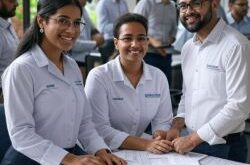· ASME’s inaugural congress in India underscores sustainability, innovation, inclusivity, and academia–industry collaboration, while spotlighting India’s MSMEs, hardware-led startups at Innovation Square, and future-ready skills through the Engineering Education Symposium, women in engineering panel, and the Expo Showcase.
Hyderabad, 12th September 2025: The American Society of Mechanical Engineers (ASME) today continued its flagship International Mechanical Engineering Congress & Exposition (IMECE) India 2025, the world’s largest mechanical engineering congress, hosted for the first time in Hyderabad. The event has spotlighted India’s leadership in engineering and innovation, with thought-provoking keynotes, policy dialogues.
“The Departments of ITE&C and Industries & Commerce are driving Telangana’s emergence as a hub for innovation, technology, and entrepreneurship. With progressive policies, robust infrastructure, and strong industry collaboration, we are creating an enabling ecosystem for startups, MSMEs, and global enterprises to thrive. Platforms like IMECE India 2025 not only showcase India’s engineering and technological excellence but also reinforce Telangana’s commitment to becoming a preferred destination for investment and innovation”, Shri Sanjay Kumar, IAS Special Chief Secretary, Department of Information Technology, Electronics & Communications (ITE&C) and Department of Industries & Commerce.
Hon. Chief Guest – Shri Srinivas Kondapalli, Minister, MSME, Government of Andhra Pradesh , stated, “I feel deeply honoured to be a part of ASME’s IMECE India 2025. Andhra Pradesh, with its strong infrastructure, sectoral parks, and innovation hubs, is fast emerging as a hub for manufacturing, MSMEs, and exports — contributing nearly 8% to India’s total exports. With forward-looking policies, investment-ready industrial nodes, and a focus on sustainability, the state is creating unprecedented opportunities for industries and startups alike. IMECE India perfectly complements this vision by enabling global collaborations, advancing engineering research, and strengthening academia–industry partnerships to reimagine India as an innovation-driven economy. Together, we are laying the foundation for a future where India leads the world in sustainable innovation and industrial growth.”
Mr. Pawan Kumar Chandana, Co-Founder, Skyroot Aerospace delighted with his experience at IMECE 2025 commented, “India is no longer just a consumer of advanced technologies — we are now building and exporting world-class deep tech to the globe. From defence to drones, biotech to quantum, and space to semiconductors, Indian startups are driving breakthroughs that will transform industries and societies. Skyroot is delighted to be a part of IMECE India 2025, and we look forward to such platforms providing India a global stage to showcase innovation.”
Mr. Madhukar Sharma, President & Director of ASME India , stated, “IMECE India 2025 marks a transformative moment for Indian engineers, researchers, and the wider technical community. By connecting them with global networks and fostering applied research through our Technical and Engineering Communities, covering areas like Additive Manufacturing & 3D Printing, Advanced Materials & Manufacturing Technologies, Advance in Thermal Technologies, Gas Turbines, Offshore Pipelines Transmission & Distribution System, Cyber Physical Systems + AI/ML, and Structures Structural Dynamics & Materials, we are enabling the development of more sustainable and innovative products.”
“We are deeply committed to partnering with India to support research and development, expand access to global engineering tools, and bridge academia and industry through platforms including IMECE India,” said ASME President Lester Su, Ph.D. “We are particularly inspired by India’s ambitious work in sustainability, from renewable energy integration to smart manufacturing and resilient infrastructure. These are the kinds of breakthroughs that will shape the next century, and India is already taking the lead.”
IMECE India’s core themes of sustainability, innovation, and inclusivity are reflected in the plenary keynote, “Advancing New Energy – Creating Vibrant and Enabling Infrastructure for Rapid Green Hydrogen Technology Development and Deployment for Clean Energy Transition.” India has already taken rapid strides in building a robust ecosystem to support clean energy technologies, particularly hydrogen and waste-to-energy. The first tranche of pilot-scale 1 MW–10 MW green hydrogen projects are underway, while regulators are actively framing compliance and certification mechanisms. Yet, key challenges remain, high costs, low-temperature storage, and workforce skilling. The panel explored pathways for collaboration across industry, research institutions, startups, and government to accelerate innovation, ensure equitable energy access, and build a cohesive, future-ready clean energy infrastructure aligned with national missions such as Make in India, Atmanirbhar Bharat 2047, the India Semiconductor Mission, and the National Green Hydrogen Mission.
 Newspatrolling.com News cum Content Syndication Portal Online
Newspatrolling.com News cum Content Syndication Portal Online







